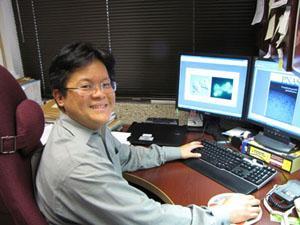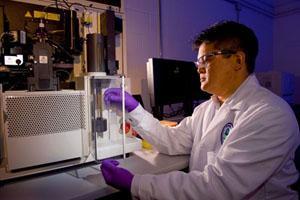Meet EPA Microbiologist Eric Villegas, Ph.D.

Keeping Drinking Water Safe
Eric Villegas, Ph.D. is a research microbiologist in EPA's Office of Research and Development. His recent work focuses on next generation sequencing technology to better understand risks associated with waterborne parasites.
Dr. Villegas is on the Editorial Board for The Scientific World Journal. He is a member of the American Society of Parasitologists, the American Society for Microbiology and the American Water Works Association.
How does your science matter?
My research primarily focuses on parasites in water. We're working to determine the levels of these parasites as they relate to human exposure risks. In order to provide that data, we have to develop tools that enable us to detect the parasites. The tools we have developed now allow us to better assess the risks associated to these pathogens and provide insights on how to mitigate these issues.
If you could have dinner with any scientist, past or present, who would it be and what would you like to ask them about?
My choice would be the two "Steves" who started Apple, Steve Jobs and Steve Wozniak. I'd like to ask them what were their inspirations and driving forces behind their development of the Apple computer. Do they have any words of wisdom for the next generation scientists and engineers?
When did you first know you wanted to pursue science as a career?
When I was in fifth grade, my parents gave me a children's chemistry set. It was one of those with which you made stuff like perfumes by boiling rose petals in water. That was the first time I remember doing science for fun. Later the same year, I also made a light dimmer out of a toothpaste cap, piece of wood, copper wire, iron nails, a battery, and a light bulb. So I guess fifth grade was a pretty big year for me scientifically.

Tell us about your background.
I did my undergraduate studies at California State Northridge where I got a degree in Biology with an emphasis in Cellular and Molecular Biology. I went on to get a Ph.D. in Immunology at the University of Pennsylvania's Perlman School of Medicine where I worked on understanding immune responses to parasitic infections. After that, I did a postdoctoral fellowship at the University of California Berkeley to continue my work on understanding host regulatory factors modulating resistance to infection.
What do you like most about your research?
My research is a hybrid between basic and applied research. One part provides the necessary scientific data that support the Agency's mission, which is to protect human health. The other part addresses fundamental questions related to understanding host-pathogen interaction.
Working here makes me feel like I'm making a difference or at least that I'm a step closer to doing so.
If you were not a scientist, what do you think you would be doing?
I would have been a photographer or a medical illustrator. I was close to graduating with a double major in Fine Arts and Biology as an undergraduate, but then an opportunity to volunteer to work in a research lab isolating mitochondrial DNA from bacteria came up, which really pushed me to pursue research.
Any advice for students considering a career in science?
My wife is also a scientist so you can imagine the kinds of conversations we have at home and with our children! Science is really a lifestyle. It’s not easy and you can’t just do it forty hours a week. You need passion, patience, and perseverance because some projects take years and you don’t know if they’ll work or not.
